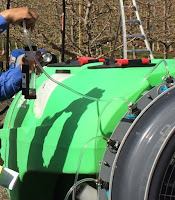Pesticide Management Division
 |
| Measuring nozzle output, as practiced in a WSDA training for pesticide applicators. |
Last year, WSDA’s Pesticide Management Division investigated 161 incidents involving potential violations of the state’s pesticide laws and 64 of those involved allegations of pesticides drifting onto neighboring property. So far this year, WSDA has received nine complaints of pesticide drift and most involve potential human exposure. All are currently being investigated.
To ensure that pesticides do not drift beyond the intended treatment area, WSDA offers the following suggestions to reduce the risk.
- Read the label on the pesticides being applied and abide by all precautions and restrictions on safe handling, necessary protective equipment, buffers, the effect on crops and more.
- Pay special attention near sensitive areas such as highways, homes, schools and other occupied dwellings or where workers are present.
- Properly calibrate equipment, using the proper nozzles and pressure to keep the spray on-target.
- Based on the amount of foliage and tree size and shape, optimize your sprayer by using the appropriate volumes of water and air, and the correct pressure and nozzle size.
- Scout the areas bordering the place that’s being treated.
- Evaluate conditions such as wind speed, wind direction, and temperature.
- Stop applying immediately if conditions change in ways that increase the risk of drift to unsafe levels or if anyone approaches the area without proper protection.

Illustration of the steps to calibrate a sprayer, from a
WSDA training presentation for pesticide applicators.
WSDA licenses about 28,000 pesticide applicators, dealers, consultants and inspectors. Licensees are trained to apply pesticides safely. If problems do occur, WSDA will investigate complaints that allege the state’s pesticide laws have been violated -- including cases of drift, worker exposure, or environmental harm.
To file a complaint, email compliance@agr.wa.gov or call toll free to 1-877-301-4555. When you call, have as much information as possible ready to share with the investigator.
The state Department of Health investigates potential cases of pesticide illnesses. Visit their website for more information.
